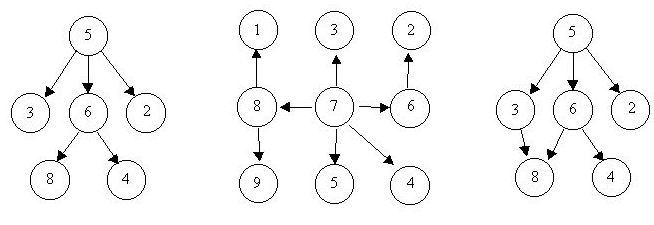Is It A Tree?
| Time Limit: 1000MS | Memory Limit: 10000K | |
| Total Submissions: 18778 | Accepted: 6395 |
Description
A tree is a well-known data structure that is either empty (null, void, nothing) or is a set of one or more nodes connected by directed edges between nodes satisfying the following properties.
There is exactly one node, called the root, to which no directed edges point.
Every node except the root has exactly one edge pointing to it.
There is a unique sequence of directed edges from the root to each node.
For example, consider the illustrations below, in which nodes are represented by circles and edges are represented by lines with arrowheads. The first two of these are trees, but the last is not.

In this problem you will be given several descriptions of collections of nodes connected by directed edges. For each of these you are to determine if the collection satisfies the definition of a tree or not.
There is exactly one node, called the root, to which no directed edges point.
Every node except the root has exactly one edge pointing to it.
There is a unique sequence of directed edges from the root to each node.
For example, consider the illustrations below, in which nodes are represented by circles and edges are represented by lines with arrowheads. The first two of these are trees, but the last is not.

In this problem you will be given several descriptions of collections of nodes connected by directed edges. For each of these you are to determine if the collection satisfies the definition of a tree or not.
Input
The input will consist of a sequence of descriptions (test cases) followed by a pair of negative integers. Each test case will consist of a sequence of edge descriptions followed by a pair of zeroes Each edge description will consist of a pair of integers; the first integer identifies the node from which the edge begins, and the second integer identifies the node to which the edge is directed. Node numbers will always be greater than zero.
Output
For each test case display the line "Case k is a tree." or the line "Case k is not a tree.", where k corresponds to the test case number (they are sequentially numbered starting with 1).
Sample Input
6 8 5 3 5 2 6 4 5 6 0 0 8 1 7 3 6 2 8 9 7 5 7 4 7 8 7 6 0 0 3 8 6 8 6 4 5 3 5 6 5 2 0 0 -1 -1
Sample Output
Case 1 is a tree. Case 2 is a tree. Case 3 is not a tree.
题目大意:给出一些数字对,代表父节点和子节点,输入以0 0结束,问这些节点能否构成一棵树。
解题方法:判断能否构成一棵树的条件:1.空树是一棵树。2.树中不存在回路。3.森林不是树。可以用并查集判断是否存在回路,然后用并查集扫描一遍,看是否所有节点的最顶端父节点相同,不同则为森林。
#include <stdio.h> #include <iostream> #include <string.h> using namespace std; typedef struct { int rank; int parent; }UFSTree; UFSTree Set[10000]; int Stack[10000];//用于保存每个节点对中的父节点,以检测是否为森林 void MakeSet() { for (int i = 0; i < 10000; i++) { Set[i].rank = 0; Set[i].parent = i; } } int FindSet(int x) { if (x == Set[x].parent) { return x; } else { return FindSet(Set[x].parent); } } void UnionSet(int x, int y) { x = FindSet(x); y = FindSet(y); if (Set[x].rank > Set[y].rank) { Set[y].parent = x; } else { Set[x].parent = y; if (Set[x].rank == Set[y].rank) { Set[y].rank++; } } } int main() { int x, y, nCase = 1, top = 0; bool flag = true; MakeSet(); while(scanf("%d%d", &x, &y) != NULL && x != -1 && y != -1) { while(1) { if (x == 0 && y == 0) { break; } Stack[top] = x; top++; //如果两个节点处于同一集合,则不能形成一棵树 if (FindSet(x) == FindSet(y)) { flag = false; } else { UnionSet(x, y); } scanf("%d%d", &x, &y); } if (flag) { //查询每个节点对中的父节点,看所有节点的最顶端父节点是否相同,不相同则为森林 for (int i = 0; i < top - 1; i++) { int n1 = FindSet(Stack[i]); int n2 = FindSet(Stack[i + 1]); if (n1 != n2) { flag = false; break; } } } if (flag) { flag = true; printf("Case %d is a tree. ", nCase++); } else { flag = true; printf("Case %d is not a tree. ", nCase++); } MakeSet(); top = 0; } return 0; }